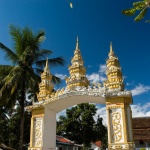Laos Traditions
 Photographs of local residents is recommended only with their consent. In the markets is a common practice some conversation and a small purchase from the seller, after which he simply can not deny the picture.
Photographs of local residents is recommended only with their consent. In the markets is a common practice some conversation and a small purchase from the seller, after which he simply can not deny the picture.Women do not have the right to appeal to the monks, in turn, Buddhist monks allowed to touch a woman or take anything from her. Therefore, a woman who wishes to make donations to the monks must first pass this man, who, in turn, will give a monk. Perhaps, and just put an offering on the edge of saffron cloak or shawl, which is on the other hand holds a monk. But in many churches these canons are violated quite widely, so it is often easier to ask about the order on the territory of a particular object on the ground.
Men and women should not show affection to each other publicly.
All the statues of Buddha, in whatever form and state they are, are sacred. Therefore, should not climb on them to be photographed (the penalty is usually quite hard - until the destruction of the film, which were sealed such blasphemy), or in any other form of disrespect them.
Touching the head of local residents (including young children) means the infliction of a terrible insult. Sitting man, especially if he crossed his legs, in no event shall pay a foot in the direction of people and statues of Buddha.
The traditional greeting in Laos - "wai" or "BS" - composed of "boat" hands, affixed to the head (but not above the nose) or chest without touching the body. Often the gesture is accompanied by a slight bow to express respect for people of higher status or age. This is not just a gesture of greeting, but for the most part a status effect with a certain etiquette. The order of the commission of "BS" is very strict and is subject to a wide Code - hand position and the duration of a gesture is determined by the acclaimed social status - the greater the person, the higher rise palms and take longer gesture. Can not "return" "BS" for children and support staff, there are also a number of other conventions, so the tourists is better not to blindly adopt this custom, without first examining in detail all the subtleties of its application. In everyday life the locals very cost friendly nod and a universal "high", shaking hands with each other is not accepted.
Family - an important and powerful unit of Lao society. Average Laotian family, according to statistics, consists of seven members: father, mother, children (sometimes already married) and elderly parents, as well as one or two other relatives. The head of the family is usually the man, but there was no harassment of women in the country is not so in the modern Laotian family, especially in the cities, you can see quite a European system of relationships. Lao parents usually try to avoid the direct supervision of children. In the local tradition of education and upbringing of children is through communication with other members of the family and society. Also, parents rarely intervened in the selection of spouses for their children - one of the local legend says that true love appears only in pairs, which was still in love "in a past life."
Sami ceremony of betrothal and marriage is quite complicated. Traditionally, the groom's parents give gifts or a certain amount of money to parents of the bride before the wedding. However, this is not a purchase or something similar - after wedding the young begin to family life, as part of the household of the family of his wife, and live well within two to three years. And only a few years later, just after the birth of children, young family gets an opportunity to start their own home (usually in this case they are trying to find housing near the husband's parents' home).
In the past, Lao used only names, and they are not given by parents, elders, or astrologers, who picked up (and picked up so far) with their special meaning. Surnames began to use only since 1943, when they were imposed by force, by law. However, local residents still refer to each other only by name and kept the tradition to change their names according to occupation, profession or social status. The bride can take the name and surname of her husband or leave your own initials, but the children receive their father's name. Inheritance is patrilineal. At the same time, strong family ties remain a young family with both parents' homes. Divorce - a fairly rare phenomenon. Monogamy is encouraged, but polygamy is absolutely legitimate.
Festivals
Festivals in Laos are usually tied to the agricultural seasons and Buddhist holidays. Celebrating Lunar New Year is held in mid-April, accompanied by numerous religious ceremonies and street festivities. In May, you can watch the festival Bun Bang FAI, during which Lao dancing and singing and firing off bamboo rockets, begging the gods for rain. In November in Vientiane is one week festival of dance and fireworks Luang.
Holidays and weekends